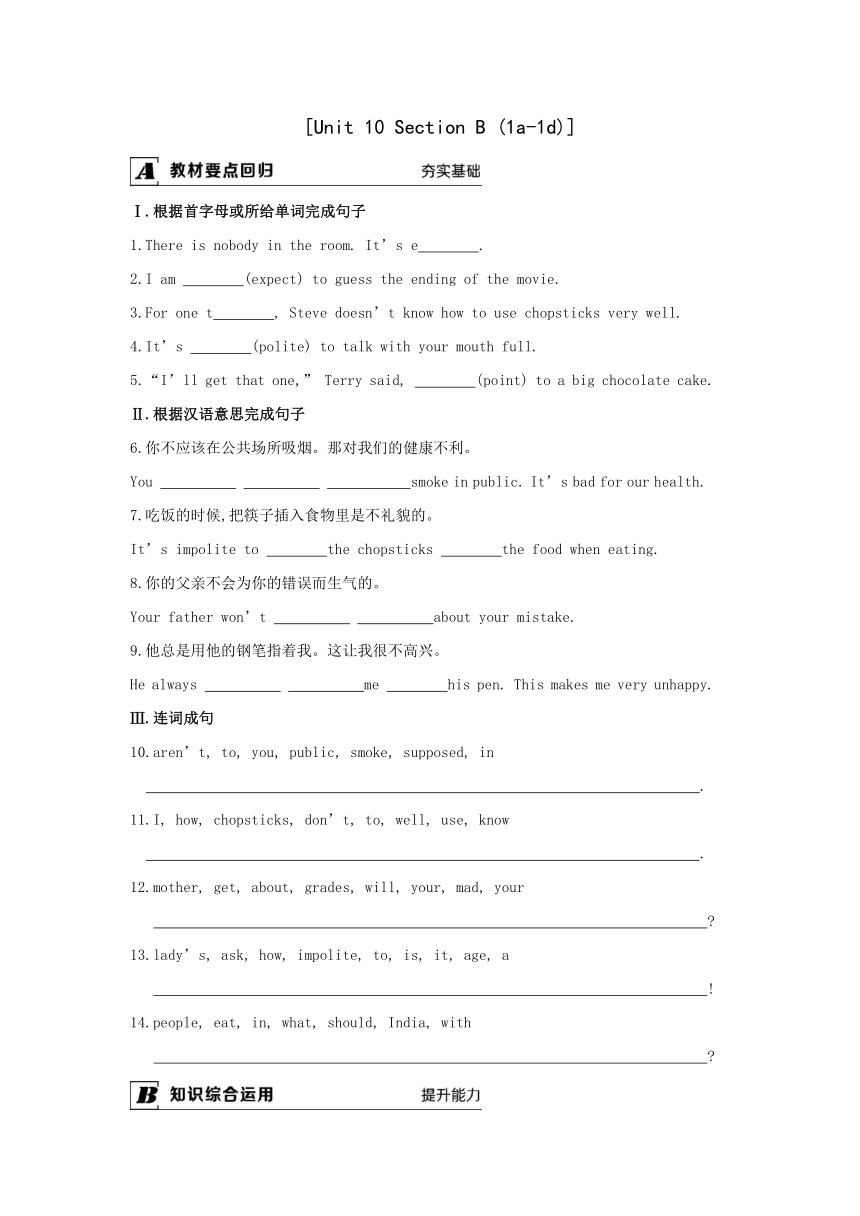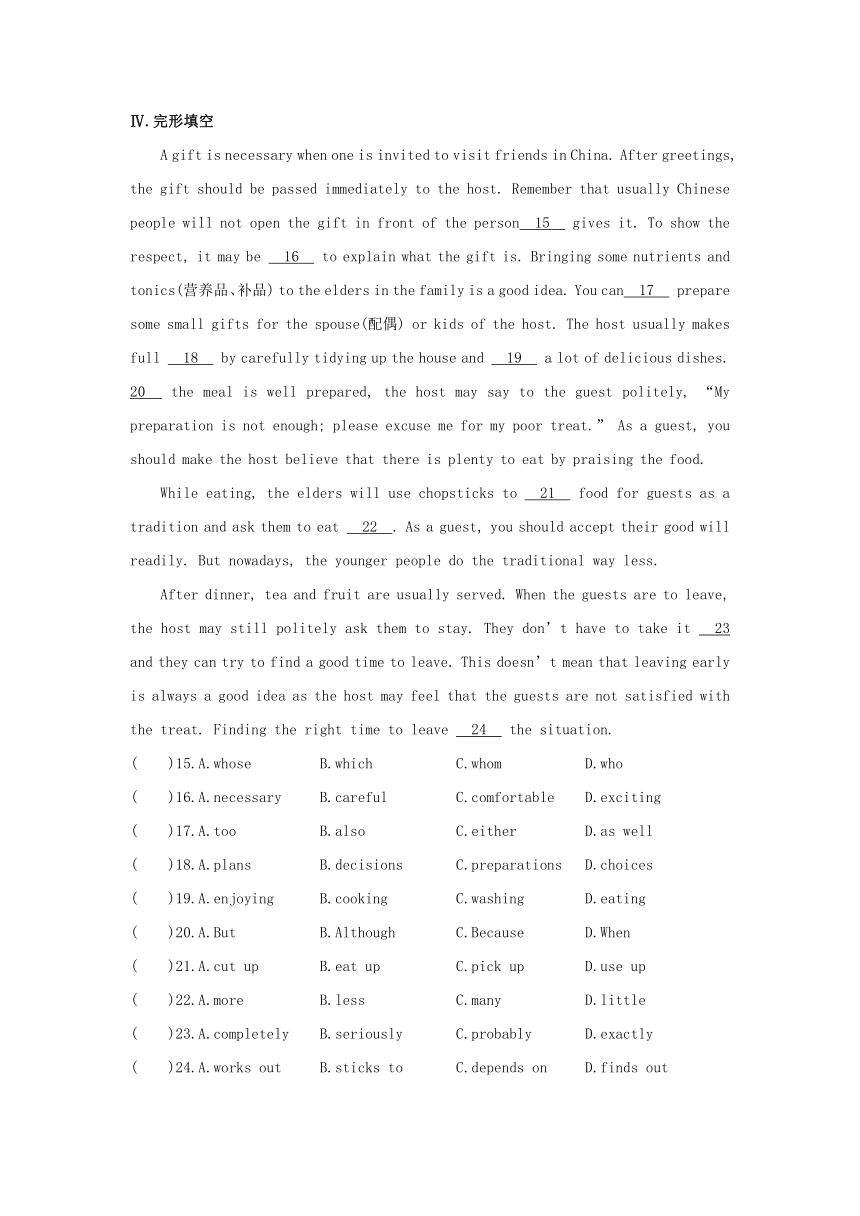九年级全一册英语(人教版)同步训练:Unit 10 You're supposed to shake hands. Section B (1a-1d)(含答案)
文档属性
| 名称 | 九年级全一册英语(人教版)同步训练:Unit 10 You're supposed to shake hands. Section B (1a-1d)(含答案) |

|
|
| 格式 | docx | ||
| 文件大小 | 72.5KB | ||
| 资源类型 | 教案 | ||
| 版本资源 | 人教新目标(Go for it)版 | ||
| 科目 | 英语 | ||
| 更新时间 | 2022-10-19 14:21:45 | ||
图片预览


文档简介
[Unit 10 Section B (1a-1d)]
Ⅰ.根据首字母或所给单词完成句子
1.There is nobody in the room. It’s e .
2.I am (expect) to guess the ending of the movie.
3.For one t , Steve doesn’t know how to use chopsticks very well.
4.It’s (polite) to talk with your mouth full.
5.“I’ll get that one,” Terry said, (point) to a big chocolate cake.
Ⅱ.根据汉语意思完成句子
6.你不应该在公共场所吸烟。那对我们的健康不利。
You smoke in public. It’s bad for our health.
7.吃饭的时候,把筷子插入食物里是不礼貌的。
It’s impolite to the chopsticks the food when eating.
8.你的父亲不会为你的错误而生气的。
Your father won’t about your mistake.
9.他总是用他的钢笔指着我。这让我很不高兴。
He always me his pen. This makes me very unhappy.
Ⅲ.连词成句
10.aren’t, to, you, public, smoke, supposed, in
.
11.I, how, chopsticks, don’t, to, well, use, know
.
12.mother, get, about, grades, will, your, mad, your
13.lady’s, ask, how, impolite, to, is, it, age, a
!
14.people, eat, in, what, should, India, with
Ⅳ.完形填空
A gift is necessary when one is invited to visit friends in China. After greetings, the gift should be passed immediately to the host. Remember that usually Chinese people will not open the gift in front of the person 15 gives it. To show the respect, it may be 16 to explain what the gift is. Bringing some nutrients and tonics(营养品、补品) to the elders in the family is a good idea. You can 17 prepare some small gifts for the spouse(配偶) or kids of the host. The host usually makes full 18 by carefully tidying up the house and 19 a lot of delicious dishes. 20 the meal is well prepared, the host may say to the guest politely, “My preparation is not enough; please excuse me for my poor treat.” As a guest, you should make the host believe that there is plenty to eat by praising the food.
While eating, the elders will use chopsticks to 21 food for guests as a tradition and ask them to eat 22 . As a guest, you should accept their good will readily. But nowadays, the younger people do the traditional way less.
After dinner, tea and fruit are usually served. When the guests are to leave, the host may still politely ask them to stay. They don’t have to take it 23 and they can try to find a good time to leave. This doesn’t mean that leaving early is always a good idea as the host may feel that the guests are not satisfied with the treat. Finding the right time to leave 24 the situation.
( )15.A.whose B.which C.whom D.who
( )16.A.necessary B.careful C.comfortable D.exciting
( )17.A.too B.also C.either D.as well
( )18.A.plans B.decisions C.preparations D.choices
( )19.A.enjoying B.cooking C.washing D.eating
( )20.A.But B.Although C.Because D.When
( )21.A.cut up B.eat up C.pick up D.use up
( )22.A.more B.less C.many D.little
( )23.A.completely B.seriously C.probably D.exactly
( )24.A.works out B.sticks to C.depends on D.finds out
教 师 详 解 详 析
[Unit 10 Section B (1a-1d)]
Ⅰ.1.empty 2.expected 3.thing 4.impolite 5.pointing
Ⅱ.6.aren’t supposed to 7.stick; into 8.get mad/angry 9.points at; with
Ⅲ.10.You aren’t supposed to smoke in public
11.I don’t know how to use chopsticks well
12.Will your mother get mad about your grades
13.How impolite it is to ask a lady’s age
14.What should people eat with in India
Ⅳ.【主旨大意】 本文主要介绍了在中国家庭做客的一些礼仪。
15.D 句意: 记住,中国人通常不会在给他们礼物的人面前打开礼物。先行词是the person, 指人,关系词用who, 在定语从句中作主语。
16.A 句意: 为了表示尊敬, 解释一下礼物是什么是必需的。necessary意为“必需的”;careful意为“小心的”;comfortable意为“舒服的”; exciting意为“令人兴奋的”。根据 “To show the respect”可知,此处指的是“必需的”。
17.B 句意: 你也可以准备一些小礼物给主人的配偶或孩子。too用于肯定句句尾;also用于肯定句句中;either用于否定句末尾;as well用于肯定句或疑问句末尾。此处是肯定句,且位于肯定句句中。
18.C 句意: 主人通常会通过收拾房间,烹饪许多美味佳肴来做充分准备。根据“by carefully tidying up the house and…a lot of delicious dishes”可知,此处指的是做充分准备。
19.B
20.B 句意: 尽管饭菜准备得很好,主人可能会礼貌地对客人说:“我准备得不够,请原谅我招待不周。”根据句意可知,此处应该是让步关系,所以应该用although引导。
21.C 句意: 吃饭的时候,长辈们会用筷子给客人夹菜,并请他们吃得更多。
22.A
23.B 句意: 他们不必当真,他们可以试着找个合适的时间离开。take…seriously意为“认真对待,当真”;根据“they can try to find a good time to leave”可知,此处指的是不必当真。
24.C 句意: 根据具体情况选择合适的离开时间。根据前句“This doesn't mean that leaving early is always a good idea as the host may feel that the guests are not satisfied with the treat.”可知,这并不意味着提前离开总是一个好主意,因为主人可能会觉得客人对款待不满意。由此可知,此处指的是根据具体情况。
Ⅰ.根据首字母或所给单词完成句子
1.There is nobody in the room. It’s e .
2.I am (expect) to guess the ending of the movie.
3.For one t , Steve doesn’t know how to use chopsticks very well.
4.It’s (polite) to talk with your mouth full.
5.“I’ll get that one,” Terry said, (point) to a big chocolate cake.
Ⅱ.根据汉语意思完成句子
6.你不应该在公共场所吸烟。那对我们的健康不利。
You smoke in public. It’s bad for our health.
7.吃饭的时候,把筷子插入食物里是不礼貌的。
It’s impolite to the chopsticks the food when eating.
8.你的父亲不会为你的错误而生气的。
Your father won’t about your mistake.
9.他总是用他的钢笔指着我。这让我很不高兴。
He always me his pen. This makes me very unhappy.
Ⅲ.连词成句
10.aren’t, to, you, public, smoke, supposed, in
.
11.I, how, chopsticks, don’t, to, well, use, know
.
12.mother, get, about, grades, will, your, mad, your
13.lady’s, ask, how, impolite, to, is, it, age, a
!
14.people, eat, in, what, should, India, with
Ⅳ.完形填空
A gift is necessary when one is invited to visit friends in China. After greetings, the gift should be passed immediately to the host. Remember that usually Chinese people will not open the gift in front of the person 15 gives it. To show the respect, it may be 16 to explain what the gift is. Bringing some nutrients and tonics(营养品、补品) to the elders in the family is a good idea. You can 17 prepare some small gifts for the spouse(配偶) or kids of the host. The host usually makes full 18 by carefully tidying up the house and 19 a lot of delicious dishes. 20 the meal is well prepared, the host may say to the guest politely, “My preparation is not enough; please excuse me for my poor treat.” As a guest, you should make the host believe that there is plenty to eat by praising the food.
While eating, the elders will use chopsticks to 21 food for guests as a tradition and ask them to eat 22 . As a guest, you should accept their good will readily. But nowadays, the younger people do the traditional way less.
After dinner, tea and fruit are usually served. When the guests are to leave, the host may still politely ask them to stay. They don’t have to take it 23 and they can try to find a good time to leave. This doesn’t mean that leaving early is always a good idea as the host may feel that the guests are not satisfied with the treat. Finding the right time to leave 24 the situation.
( )15.A.whose B.which C.whom D.who
( )16.A.necessary B.careful C.comfortable D.exciting
( )17.A.too B.also C.either D.as well
( )18.A.plans B.decisions C.preparations D.choices
( )19.A.enjoying B.cooking C.washing D.eating
( )20.A.But B.Although C.Because D.When
( )21.A.cut up B.eat up C.pick up D.use up
( )22.A.more B.less C.many D.little
( )23.A.completely B.seriously C.probably D.exactly
( )24.A.works out B.sticks to C.depends on D.finds out
教 师 详 解 详 析
[Unit 10 Section B (1a-1d)]
Ⅰ.1.empty 2.expected 3.thing 4.impolite 5.pointing
Ⅱ.6.aren’t supposed to 7.stick; into 8.get mad/angry 9.points at; with
Ⅲ.10.You aren’t supposed to smoke in public
11.I don’t know how to use chopsticks well
12.Will your mother get mad about your grades
13.How impolite it is to ask a lady’s age
14.What should people eat with in India
Ⅳ.【主旨大意】 本文主要介绍了在中国家庭做客的一些礼仪。
15.D 句意: 记住,中国人通常不会在给他们礼物的人面前打开礼物。先行词是the person, 指人,关系词用who, 在定语从句中作主语。
16.A 句意: 为了表示尊敬, 解释一下礼物是什么是必需的。necessary意为“必需的”;careful意为“小心的”;comfortable意为“舒服的”; exciting意为“令人兴奋的”。根据 “To show the respect”可知,此处指的是“必需的”。
17.B 句意: 你也可以准备一些小礼物给主人的配偶或孩子。too用于肯定句句尾;also用于肯定句句中;either用于否定句末尾;as well用于肯定句或疑问句末尾。此处是肯定句,且位于肯定句句中。
18.C 句意: 主人通常会通过收拾房间,烹饪许多美味佳肴来做充分准备。根据“by carefully tidying up the house and…a lot of delicious dishes”可知,此处指的是做充分准备。
19.B
20.B 句意: 尽管饭菜准备得很好,主人可能会礼貌地对客人说:“我准备得不够,请原谅我招待不周。”根据句意可知,此处应该是让步关系,所以应该用although引导。
21.C 句意: 吃饭的时候,长辈们会用筷子给客人夹菜,并请他们吃得更多。
22.A
23.B 句意: 他们不必当真,他们可以试着找个合适的时间离开。take…seriously意为“认真对待,当真”;根据“they can try to find a good time to leave”可知,此处指的是不必当真。
24.C 句意: 根据具体情况选择合适的离开时间。根据前句“This doesn't mean that leaving early is always a good idea as the host may feel that the guests are not satisfied with the treat.”可知,这并不意味着提前离开总是一个好主意,因为主人可能会觉得客人对款待不满意。由此可知,此处指的是根据具体情况。
同课章节目录
- Unit 1 How can we become good learners.
- Section A
- Section B
- Unit 2 I think that mooncakes are delicious!
- Section A
- Section B
- Unit 3 Could you please tell me where the restroom
- Section A
- Section B
- Unit 4 I used to be afraid of the dark.
- Section A
- Section B
- Unit 5 What are the shirts made of?
- Section A
- Section B
- Review of Units 1-5
- Unit 6 When was it invented?
- Section A
- Section B
- Unit 7 Teenagers should be allowed to choose their
- Section A
- Section B
- Unit 8 It must belong to Carla.
- Section A
- Section B
- Unit 9 I like music that I can dance to.
- Section A
- Section B
- Unit 10 You're supposed to shake hands.
- Section A
- Section B
- Review of Units 6-10
- Unit 11 Sad movies make me cry.
- Section A
- Section B
- Unit 12 Life is full of the unexpected
- Section A
- Section B
- Unit 13 We're trying to save the earth!
- Section A
- Section B
- Unit 14 I remember meeting all of you in Grade 7.
- Section A
- Section B
- Review of Units 11-14
